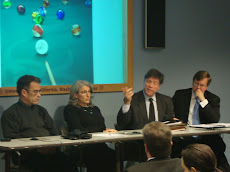According to the Wall Street Journal, our spies did not know that Russia was about to invade Crimea. Even when they saw troops positioning, they failed to overhear phone calls that discussed the invasion. They had no clue the Russians were communicating using methods we hadn't tapped. They had no idea they were missing something.
Can NSA stop wasting money and talent on the easy targets (like you and me) and actually do what is supposedly (for no one without a very high clearance has ever seen NSA's charter) the job for which NSA was created: to protect the US from foreign enemies?
"No statute establishes the NSA," former Senate intelligence committee chairman Frank Church reported, "or defines the permissible scope of its responsibilities." That is not very comforting. And whatever happened to HUMINT? Why did we have no spies on the ground in Crimea?
From the WSJ:
U.S. military satellites spied Russian troops amassing within striking distance of Crimea last month. But intelligence analysts were surprised because they hadn't intercepted any telltale communications where Russian leaders, military commanders or soldiers discussed plans to invade.
America's vaunted global surveillance is a vital tool for U.S. intelligence services, especially as an early-warning system and as a way to corroborate other evidence. In Crimea, though, U.S. intelligence officials are concluding that Russian planners might have gotten a jump on the West by evading U.S. eavesdropping.
"Even though there was a warning, we didn't have the information to be able to say exactly what was going to happen," a senior U.S. official says...
U.S. officials haven't determined how Russia hid its military plans from U.S. eavesdropping equipment that picks up digital and electronic communications...
Inside Crimea, Russian troops exercised what U.S. officials describe as extraordinary discipline in their radio and cellphone communications. Remarks that were intercepted by U.S. spy agencies revealed no hint of the plans...
European Command officials again asked for more intelligence-collection resources. The military increased satellite coverage of Ukraine and Russia but couldn't steer too many resources away from Afghanistan, North Korea, Iran and other hot spots, U.S. officials say. (With hundreds of orbiting satellites we couldn't do better?--Nass)
There were no Americans on the ground in Crimea to check reports of Russian military movements, U.S. officials say. The U.S. also didn't have drones overhead to gather real-time intelligence, officials say. That increased the U.S.'s reliance on satellite imagery and information gleaned from an analysis of social media, which was muddled by Russian disinformation. State Department officials declined to discuss any technical-intelligence activities.
If Mr. Putin decided to launch a takeover, many U.S. intelligence analysts thought he would use troops participating in the military exercises. Officials now say they underestimated the quality of Russian forces inside Crimea...










No comments:
Post a Comment